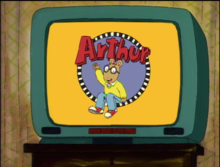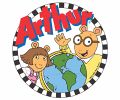The forum pages are fully operational! See this link for the latest forum topics, where users can collaborate or discuss certain topics in one place!
Arthur (TV series)
| This article is about the series. You may be looking for the character or the website. |

Arthur is a Canadian-American animated edutainment children's television program. It is based on a book series of the same name, created by Marc Brown in 1976. Brown himself, as well as some of his family, has been heavily involved in the show's production. The TV show premiered in 1996 on PBS and has been on air for 25 years, which makes this the longest-running animated children's series.[1][2] It's also the third longest-running animated TV series in the United States, behind The Simpsons and South Park. Carol Greenwald confirmed on July 27, 2021 that the series will end in 2022 after 25 seasons. The entire final season premiered on February 21, 2022, which marks the conclusion of the show's run on PBS Kids. It has won numerous awards, including several Emmys, the George Foster Peabody Award for Excellence in Broadcasting, and a BAFTA.[3][4]
Animated series[edit]
Aimed at viewers 5+ [5] Arthur's goal is to make situations that are relatable. Each episode follows Arthur Read (an eight-year-old aardvark) and his family and friends through engaging, emotional stories that explore issues faced by children such as cancer[6], bed-wetting[7], adoption[8], video game addiction[9], etc. It is a comedy that tells these stories from a child's point of view without moralizing or talking down. Situations on Arthur develop in realistic ways, and don't always turn out as people or Arthur and his friends might think.
The series airs daily in the United States on PBS during the daytime kids' block, as well as the PBS KIDS Channel. It has consistently earned high ratings on public television.[10] Arthur is notable for being the first daily television program to provide video description service for the sight-impaired starting in 1997.[11] There are over 100 countries around the world that air the program.[12] To date, there are twenty- five seasons consisting of more than 250 half-hour episodes and 10 one-hour specials. A spin-off series, Postcards from Buster, ran from 2004 to 2012.
Production[edit]
Development for the show started as early as 1993, when Carol Greenwald began working with Marc Brown to adapt his books to animation for public television.[13] He had previously turned down several similar offers presented by other commercial networks.[14]
After securing adequate funding, the series was produced by Cookie Jar Entertainment (then called Cinar, which was acquired by DHX Media, now WildBrain). In 2012, the production of the series shifted to 9 Story Media Group[15] and finally Oasis Animation.[10] It has been a co-production of WGBH throughout the duration of the show.
For the first fifteen seasons, the show used traditional hand-drawn animation, with only the coloring done digitally. Beginning with the 16th season, the show was created using digital computer animation software, such as Flash and Toon Boom.[16][17] This also coincided with widescreen, high-definition broadcasts on PBS (where available), though this 16:9 option had been available in some non-U.S. markets since Season 14.
Production of the show ceased in 2019.
In context to the storyworld itself[edit]
The characters in Arthur are self-aware that they are on television. For example, in many opening scenes Arthur narrates to the audience. The opening theme song also features D.W. flipping through an Arthur book, and then seeing him on television.
Characters have referred to members of the cast and crew in Arthur, such as Buster saying, "Roll the tape, Greg!" in "Crushed," referring to Greg Bailey, the director of the show.
Likewise, music from the series is known by the characters. In "Breezy Listening Blues," Arthur hears a slowed down version of "Believe in Yourself" and says, "I've heard this somewhere." In "D.W., Dancing Queen," Binky quotes lines from the same song. When D.W. asks if he made it up, Binky replies, "No, I heard it somewhere, but I can't remember where." As well as this, D.W. hums a few bars from the song in "Mom and Dad Have a Great Big Fight."
At the end of "The Making of Arthur," the episode suggests that Matt Damon and Arthur begin making the series after Matt sees Arthur's one minute video. This creates a paradox in which the creator's work is creating itself.
Gallery[edit]
External links[edit]
References[edit]
- ↑ All About ARTHUR (YouTube)
- ↑ http://marcbrownstudios.com/arthur/tv-show/
- ↑ http://pressroom.pbs.org/PBS-Kids/ARTHUR
- ↑ http://marcbrownstudios.com/arthur/
- ↑ https://www.commonsensemedia.org/tv-reviews/arthur
- ↑ "The Great MacGrady"
- ↑ "Jenna's Bedtime Blues"
- ↑ "Big Brother Binky"
- ↑ "Sue Ellen Gets Her Goose Cooked"
- ↑ Jump up to: 10.0 10.1 https://www.animationmagazine.net/tv/oasis-provides-production-services-for-pbss-arthur/
- ↑ https://www.pbs.org/parents/shows/arthur/about/
- ↑ https://www.rmichelson.com/illustration/marc-brown/
- ↑ https://kidscreen.com/1997/11/01/19938-19971101/
- ↑ https://www.nytimes.com/1996/11/10/tv/arthur-the-aardvark-accepts-a-mission.html
- ↑ https://www.hollywoodreporter.com/news/pbs-arthur-cartoon-gets-new-237842
- ↑ https://www.animationmagazine.net/tv/9-story-to-co-produce-with-wgbh-new-season-of-arthur/
- ↑ https://blog.toonboom.com/lgbtq-family-friendly-animated-series-pride-month




